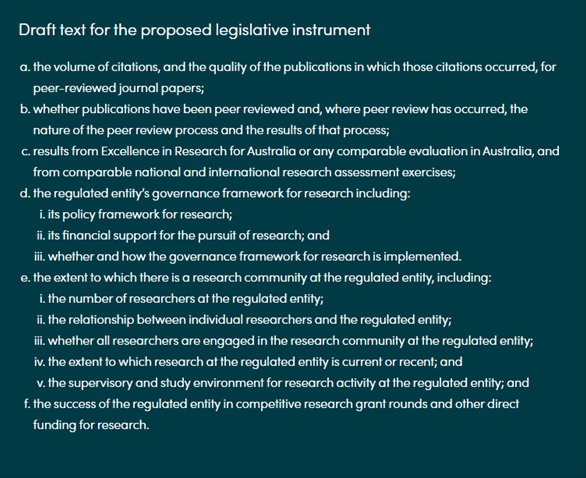April 28, 2021
Comments by:
- Professor Grant Pitman APM
- Mrs. Runali Alpesh Maniya
Research and Policy House is a Not-for-profit Think Tank, established with an aim to engage widely with decision-makers from government, businesses, the not-for-profit sector and communities. The objective is to influence the formulation of a progressive and result-oriented-policy for the greater good of the society. It provides a platform for publication of academic, industry, opinion or community papers.
In February 2021, the Australian Parliament passed the Higher Education Legislation Amendment (Provider Category Standards and Other Measures) Bill 2020. The Bill amends the Tertiary Education Quality and Standards Agency Act 2011 (TEQSA Act) to allow TEQSA to make an assessment of the quality of the research undertaken by Australian Universities. The list of assessment of research quality is as follows:

However, it may be more important to link research regulatory for industry and the community and could be expanded further rather than based on an “output” text. Instead of focusing on peer review and publication process, it is recommended to have more emphasis on lecturing component of courses and its impacts on policies and strategies. The linkage between current and long-term benefits could be included in demonstrating that the NOW affects the future. Some academics have argued over the past two decades that social science research has little or no impact on government policy.
Research argues that measuring the research impact of social science research is difficult and evaluation. Having low impact on policy and for practitioners, and various factors affecting the uptake, the social science research evaluation should consider both quantitative and subjective. In Australia, efforts have been made to ensure academics to be more mindful of the impact of their research to the end-users (Ferguson, Cherney, Head, Povey, & Boreham, 2015)
In addition, the Report “An Indian Economy Strategy to 2035” by Peter Varghese recognized and emphasized the need for research and economic growth between countries like India and Australia. By supporting the international research component, Australian Universities and other higher educational institutions which could receive further recognition for research along with the acknowledgment of higher educational status in the university category.” The Report stated that –
“Research collaboration is a pathway to commercialisation and technological advancement; twinning programs; student exchanges; and the establishment of a pipeline from undergraduate to postgraduate and doctoral studies. To enhance the credibility of Australian Education in India is through increasing the research and teaching. This research and teaching should focus on issues that are high priority to Indian economy. It is also recommended that The Australian Government through Austrade or DFAT should commission the short-term research projects. The aim behind this is to better understand the experience and potential of Australian institutional investors in India or of Indian investors in Australia.”
This report identified that strong benefits of research collaboration can be delivered between countries like India and Australia, particularly in higher degree research level. This would help student exchange and economic growth of both the countries.
Short-term research-intensive programs could also develop prospective PHD students identifying possible prospective supervisors and research fields. These research-intensive programs could be undertaken during the summer break and it could be a jointly developed program.
In addition, the report identified that agriculture and cybersecurity are growing sector and lacks skilled professionals to operate and maintain the systems. Varghese recognizes and acknowledges that Australia as having strong capabilities in both the field and can provide its expertise to India. The report also emphasized that, “Australian companies and institutions could also enter the training domain, using their expertise and experience for capability building in India through the delivery of formal cyber security education programmes, especially Master’s programs in Australia or through train-the-trainer modules in India.”
This collaborative inter-country approach could be used to support the relevant regulatory text by linking the international research component to include connectivity between government policy, research, trade, and economic achievements. Australian universities and other higher educational institutions could receive not only recognition for research but given due acknowledgement in pursuit of higher educational status in a particular provider category.
Perhaps, there is also scope to include how the research also affects the local economy e.g., the Deakin University and the Geelong community (“Partnership and Regulation – Professor Jane den Hollander AO, former Vice Chancellor, Deakin University, presentation at TEQSA Conference 16 September 2019). Should the research funding to better defined by how it is used rather than an input or output text?
References:
Consultation: Draft legislative instrument. (2021). Retrieved from https://www.teqsa.gov.au/consultation-draft-legislative-instrument
Ferguson, M., Cherney, A., Head, B., Povey, B., & Boreham, P. (2015). The utilisation of social science research – the perspectives of academic researchers in Australia. Journal of Sociology.
Varghese, P., 2018. An Indian Economic Strategy to 2035. [online] DFAT. Available at: <https://www.dfat.gov.au/geo/india/ies/index.html>.




